
 Flash News
Flash News
Drenova prison police officer arrested for bringing drugs and illegal items into cell
Lavrov: NATO is risking self-destruction with new military budget
Kurti and Vučić "face off" tomorrow in Skopje
Construction worker dies after falling from scaffolding in Berat
The prosecution sends two Korça Municipality officials to trial

Yahya Sinwar, the alleged architect of the deadly October 7 attack on Israel, the new leader of Hamas, the group designated a terrorist organization by the United States and the European Union, is known for his close ties to Iran. His appointment on August 6 as head of the Palestinian group's political bureau followed the assassination of his predecessor, Ismail Haniyeh, in Tehran on July 31, which Iran and Hamas have blamed on Israel.
After the death of Haniyeh, who had strong ties to Iranian officials, among the main names being considered for his successor were Khaled Meshaal, the former head of Hamas' political bureau, and Khalil al-Hayya, a well-known figure within the bureau, who had close ties with Haniyeh. The appointment of Sinwar, who has been head of Hamas in Gaza since 2017, came as a big surprise because many had not counted on the Iran factor, analysts said.
"None of us experts on Palestinian affairs — especially here in Israel — saw Sinwar as the person to replace Haniyeh," said Yohanan Tzoreff, a senior researcher at the Tel Aviv-based Institute for National Security Studies.
"A big reason why Sinwari is the new leader is Iran," added Tzoreff, who specializes in Israeli-Palestinian relations.
Sinwar was named the new political chief two days after discussions in Qatar of the Shura Council - a consultative body that elects the group's political bureau and has members in Gaza, the West Bank, Israeli prisons and the Palestinian diaspora. Tzoreff said that Meshaal's criticism during the Arab Spring of Syrian President Bashar al-Assad - Tehran's close ally - in 2011 made him a rather unpopular figure among Iran's top officials.
Tzoreff argued that Mashaal's return to power may have been jeopardized by the radical Palestinian group's relations with the Islamic Republic and "the Iranians may not be giving Hamas everything it needs [to fight Israeli forces]". But Sinwar is said to have remained in Gaza, where he has been hiding since the start of the war with Israel in October. The limitations on his movements and his limited ability to communicate with the world mean that Sinwar is very limited in what he can do.
"I don't expect him or Hamas to get closer to Iran. At this point, the relationship is likely to stay the same," said Joost Hiltermann, director for the Middle East and North Africa Program at the International Crisis Group.
Also known to his supporters as Abu Ibrahim, Sinwar, 61, was born in Gaza's Han Yunis refugee camp. His parents, like Haniyeh's, fled the coastal town of Ashkelon during the 1948 Arab-Israeli war that resulted in the creation of the state of Israel — or, as Palestinians call it, the "nakba" (catastrophe). Sinwar joined Hamas shortly after the group was formed in 1987 and created its own formidable internal security organization, Al-Majd. The purpose of this organization was to find Israeli spies within the group. He gained a reputation for violence and was nicknamed "The Butcher of Han Yunis".
Sinwar was captured by Israeli forces and sentenced to several life sentences on various charges, including the murder of two Israeli soldiers. He spent over two decades in prison.
"He is a person who was hardened in Israeli prisons, like many former Palestinian prisoners," said Hiltermann.
He said Sinwari learned Hebrew while in prison and it helped him learn how Israeli leaders think.
"Sinwari is very strong. He is ruthless. He is a leader, in the form of every Israeli leader," said Hiltermann.
While in prison, Sinwar organized strikes to improve working conditions and emerged as a leader of imprisoned Palestinians. His experience in prison "prepared him very well for the leadership of Hamas" and in planning the Oct. 7 attack, Hiltermann said.
Almost 1,200 people, most civilians, were killed when Hamas radicals attacked communities in southern Israel in October and took hostages. The attack prompted Israel to launch a major offensive in the Hamas-led Gaza Strip, which Palestinian sources say has killed more than 40,000 people. Sinwar was released from prison in 2011 as part of an exchange in which more than 1,000 Palestinian prisoners were released in exchange for an Israeli soldier held by Hamas.
Shortly after his release, Sinwari accompanied Haniyeh on a visit to Tehran, where he met with Iran's Supreme Leader, Ayatollah Ali Khamenei. On the same day that Sinwari was announced as Haniyeh's successor, Khamenei's X account released a short video showing Sinwari's meeting with the Iranian leader in February 2012.
Traditionally, Hamas' political bureau chief is based abroad so he can travel and maintain contact with regional allies, such as Iran and the Lebanese terrorist group Hezbollah.
But Sinwari, for whom the US Secretary of State, Antony Blinken, once joked that he is "buried 10 floors underground", located in Gaza, cannot leave the enclave because of the war. Tzoreff said that by appointing the Gaza-based leader, Hamas "sent a strong message" to Israel and Arab states that "Hamas' resistance has not collapsed."
"The main message is that no one can drive them out of the area," he added. Sinwar personally may not want to leave Gaza because his legacy is based on his stay in the enclave.
"If Sinwar leaves Gaza, the Palestinians will say he has abandoned them, like the captain leaving the ship," Hiltermann said.
Sinwar has been targeted by Israel since the start of the war, with army spokesman Admiral Daniel Hagari describing him as a "dead man" after the October 7 attack. Killing Sinwar remains a priority for the Israeli military.
The head of the Israeli army, Lt. Gen. Herzi Halevi, vowed on August 7 that his troops would target Sinwar and force Hamas "to replace the head of the politburo again"./REL
Latest news


Second hearing on the protected areas law, Zhupa: Unconstitutional and dangerous
2025-06-30 22:18:46



Israel-Iran conflict, Bushati: Albanians should be concerned
2025-06-30 21:32:42

Fuga: Journalism in Albania today in severe crisis
2025-06-30 21:07:11
"There is no room for panic"/ Moore: Serbia does not dare to attack Kosovo!
2025-06-30 20:49:53

Temperatures above 40 degrees, France closes nuclear plants and schools
2025-06-30 20:28:42
Lavrov: NATO is risking self-destruction with new military budget
2025-06-30 20:13:54
Turkey against the "Bektashi state" in Albania: Give up this idea!
2025-06-30 20:03:24

Accused of sexual abuse, producer Diddy awaits court decision
2025-06-30 19:40:44



Kurti and Vučić "face off" tomorrow in Skopje
2025-06-30 18:44:12
Tourism: new season, old problems
2025-06-30 18:27:23


Construction worker dies after falling from scaffolding in Berat
2025-06-30 17:51:44




Almost free housing: East Germany against depopulation
2025-06-30 16:43:06

Hamas says nearly 60 people killed in Gaza as Trump calls for ceasefire
2025-06-30 16:14:15
Drownings on beaches/ Expert Softa: Negligence and incompetence by institutions!
2025-06-30 16:00:03


European ports are overloaded due to Trump tariffs
2025-06-30 15:30:44
The prosecution sends two Korça Municipality officials to trial
2025-06-30 15:19:54

Lezha/ Police impose 3165 administrative measures, handcuff 19 drivers
2025-06-30 14:55:04
Young people leave Albania in search of a more sustainable future
2025-06-30 14:47:52
Record-breaking summer, health threats and preventive measures
2025-06-30 14:36:19


Constitution of the Parliament, Osmani invites political leaders to a meeting
2025-06-30 14:07:54

Heat wave 'invades' Europe, Spain records temperatures up to 46 degrees Celsius
2025-06-30 13:42:02
Accident in Vlora, car hits 2 tourists
2025-06-30 13:32:16

Kurti confirms participation in today's official dinner in Skopje
2025-06-30 13:03:27

Fight between 4 minors in Kosovo, one of them injured with a knife
2025-06-30 12:38:45

Report: Teenage girls the loneliest in the world
2025-06-30 12:20:40
Commissioner Kos and Balkan leaders meet in Skopje on Growth Plan
2025-06-30 12:07:59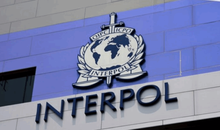
Wanted by Italy, member of a criminal organization captured in Fier
2025-06-30 11:55:53
Hundreds of families displaced by wave of Israeli airstrikes in Gaza
2025-06-30 11:45:17

Zenel Beshi: The criminal who even 50 convictions won't move from Britain
2025-06-30 11:23:19
A new variant of Covid will circulate during the summer, here are the symptoms
2025-06-30 11:14:58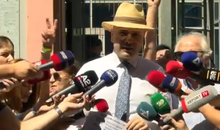

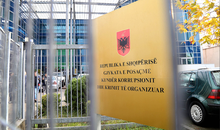
"Partizani" case, trial postponed to July 21 at the Special Court
2025-06-30 10:41:05
Uncontrolled desire to steal, what is kleptomania, why is it caused
2025-06-30 10:30:08
Requested change of security measure, hearing for Malltez postponed to July 7
2025-06-30 10:24:32


Output per working hour in Albania 35% lower than the regional average
2025-06-30 09:54:35


The trial for the "Partizani" file begins today
2025-06-30 09:27:57
22 fires in the last 24 hours in the country, 2 still active
2025-06-30 09:21:28
How is the media controlled? The 'Rama' case and government propaganda
2025-06-30 09:13:36
German top diplomat: Putin wants Ukraine to capitulate
2025-06-30 09:00:07
Foreign exchange, how much foreign currencies are sold and bought today
2025-06-30 08:44:38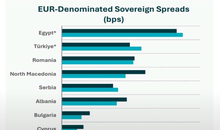
Chart/ Sovereign risk for Albania from international markets drops significantly
2025-06-30 08:26:38
Horoscope, what do the stars have in store for you?
2025-06-30 08:11:44
Clear weather and passing clouds, here is the forecast for this Monday
2025-06-30 07:59:32
Morning Post/ In 2 lines: What mattered yesterday in Albania
2025-06-30 07:47:37
Milan make official two departures in attack
2025-06-29 21:57:23
6 record tone
2025-06-29 21:30:46
4-year-old girl falls from balcony in Lezha, urgently taken to Trauma
2025-06-29 21:09:58


Assets worth 12 million euros seized from cocaine trafficking organization
2025-06-29 19:39:43
Fire in Durrës, Blushi: The state exists only on paper
2025-06-29 19:17:48

Fire endangers homes in Vlora, helicopter intervention begins
2025-06-29 18:27:51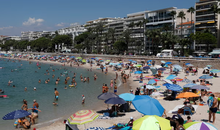
France implements smoking ban on beaches and parks
2025-06-29 18:02:08
England U-21 beat Germany to become European champions
2025-06-29 17:42:49
Trump criticizes Israeli prosecutors over Netanyahu's corruption trial
2025-06-29 17:08:10
Street market in Durrës engulfed in flames
2025-06-29 16:52:57
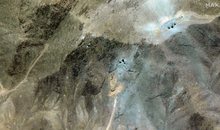
UN nuclear chief: Iran could resume uranium enrichment within months
2025-06-29 16:03:24
Albanian man dies after falling from cliff while climbing mountain in Italy
2025-06-29 15:52:01

Another accident with a single-track vehicle in Tirana, a car hits a 17-year-old
2025-06-29 15:07:15
While bathing in the sea, a vacationer in Durrës dies
2025-06-29 14:54:01
Sentenced to life imprisonment, cell phone found in Laert Haxhiu's cell
2025-06-29 14:26:40
77 people detained in protest, Vučić warns of new arrests
2025-06-29 14:07:46

From a hospital for children to a prison for politicians
2025-06-29 13:34:02
